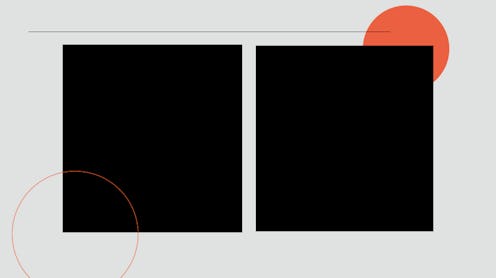Life
#BlackOutTuesday's Origins, Purpose, & Backlash, Explained

If you woke up this morning to an endless scroll of black squares on your social media feeds, you might be familiar with the hashtag #BlackOutTuesday. Following multiple incidents of police brutality across the nation, the hashtag was born to create a mindful pause on social media. The idea is to use Tuesday, June 2, to take the day off from promoting work or personal agendas, and put time and energy towards educating yourself on racism, and making actionable change.
Though posting a black square to the grid can be seen as a show of solidarity, many activists and commentators noted that blacking out social media feeds pushes previously shared resources, like anti-racist reading lists, protest information, or representatives to call, out of reach. This is, of course, the exact opposite of what many people want to have come out of the hashtag.
How Did #BlackOutTuesday Start & What Is The Goal?
The campaign originated in the music business, per Rolling Stone. Jamila Thomas, a senior director of marketing at Atlantic Records, posted a graphic on Instagram that read, “Your black [clients] are traumatized, hurt, scared, and angry...address what’s happening to Black people right now.” After gaining support from the industry, Thomas followed up with a call to action for industry professionals to "pause on Tuesday, June 2nd because the show can’t just go on as our people are being hunted and killed." (The posts are no longer available.) With the help of co-organizer Brianna Agyemang, the #THESHOWMUSTBEPAUSED hashtag and website was born.
Through the past weekend, various music labels and industry leaders vowed to pause business on Tuesday, and use the time to reflect on how they can educate themselves and not only make changes to better support the Black community, but take a stand and show solidarity. This pause was originally intended to “take a beat for an honest, reflective, and productive conversations about what actions we need to collectively take to support the Black community.”
The hashtag #BlackoutTuesday has amassed 23 million posts and counting. Celebrities like Miley Cyrus and Kylie Jenner have shared black squares, as well brands like Marc Jacobs and Yankee Candle.
Why Is It Being Criticized?
Since photos first started being published early Tuesday morning, it's been criticized by activists, celebrities, and more for different reasons. Though it might feel intuitive to use the hashtag #BlackLivesMatter on these posts, activists have pointed out that that hashtag should be reserved for informational content specifically about the movement. Tagging your black square with that hashtag makes it harder for people to find actionable resources related to protests, contact information for representatives, or charities and petitions that need attention now. It also makes the sea of voices calling for change much quieter, potentially dulling the momentum that had been created, as historian Blair Imani pointed out.
How Can I Participate Mindfully?
If you post a black square on your social media feeds, make sure you use the hashtag #BlackOutTuesday, and not #BlackLivesMatter, or forgo hashtags entirely. Feel free to add a caption with a personal statement or a quote that echoes the sentiment of the event. And if you're posting the black square in solidarity, in addition to other work, consider posting it within a photo gallery that includes helpful information, or continue sharing those resources to your Story. Or, you can forgo posting the black square altogether.
By muting your regular social media programming, you can use the time you would have spent on posting on other forms of activism. Sign petitions, call your local representatives to demand justice, donate to organizations that support the Black community, and have meaningful conversations with the people in your life about what you can do to create change. (Don't ask your Black friends to help you understand racism — it's your job, not theirs.) Spend time educating yourself on anti-racism.
Though this social media event is only one day, many influencers and content creators are vowing to stay muted for the whole week, posting only educational and informational content that promotes the Black Lives Matter movement. "Be strategic" about what you post, to quote activist and organizer Racquel Willis. What you want to achieve by posting or not is up to you, but try to embody that intention both on and offline.